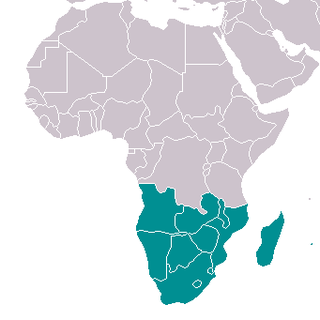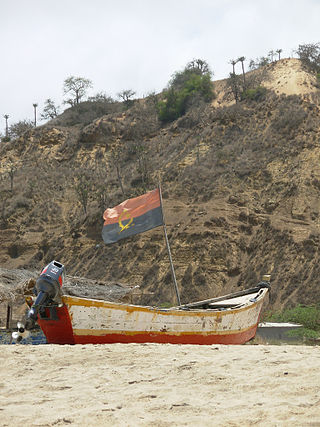
Rhodesia, officially from 1970 the Republic of Rhodesia, was an unrecognised state in Southern Africa from 1965 to 1979. During this fourteen-year period, Rhodesia served as the de facto successor state to the British colony of Southern Rhodesia, and in 1980 it became modern day Zimbabwe.
The Beira Patrol was a blockade of oil shipments to Rhodesia through Beira, Mozambique, resulting from United Nations trade sanctions on Rhodesia.

The Internal Settlement was an agreement which was signed on 3 March 1978 between Prime Minister of Rhodesia Ian Smith and the moderate African nationalist leaders comprising Bishop Abel Muzorewa, Ndabaningi Sithole and Senator Chief Jeremiah Chirau. After almost 15 years of the Rhodesian Bush War, and under pressure from the sanctions placed on Rhodesia by the international community, and political pressure from South Africa, the United Kingdom, and the United States, the Rhodesian government met with some of the internally based moderate African nationalist leaders in order to reach an agreement on the political future for the country.
The following lists events that happened during 1973 in Rhodesia.
United Nations Security Council Resolution 253, adopted unanimously on May 29, 1968, after reaffirming previous resolutions, the Council noted with concern that the measures taken so far have failed to bring the rebellion in Southern Rhodesia to an end and condemned the recent "inhuman executions carried out by the illegal regime in Southern Rhodesia which have flagrantly affronted the conscience of mankind". After further condemning the regime and calling upon the United Kingdom to end the rebellion in Southern Rhodesia the Council decided that all member states would:

United Nations Security Council Resolution 288, adopted unanimously on November 17, 1970, after reaffirming previous resolutions on the topic, the Council called upon the United Kingdom, as the legal administering Power of Southern Rhodesia, to bring an end to the illegal rebellion. The Council decided that the present sanctions against Rhodesia would remain in place and urged all states to implement all pertinent resolutions and not to grant any form of recognition to the regime.
United Nations Security Council Resolution 314, adopted on February 28, 1972, concerned that certain states were not complying with resolution 253, the Council decided that the sanctions against Southern Rhodesia set out in 253 would remain fully in force. It also urged all states to implement fully resolution 253 and declared that any legislation passed or act taken by any state with a view to permitting the importation of any commodity from Southern Rhodesia falling into the scope of 253 would undermine the sanctions and be contrary to the state's obligations under the United Nations Charter.
During the 1960s, many independence movements emerged in countries near Rhodesia, which had significant effects on political affairs and social conditions within Rhodesia.
United Nations Security Council Resolution 326, adopted on February 2, 1973, concerned with provocative and aggressive acts committed by Rhodesia against Zambia and disturbed by the continued military intervention of South Africa in Rhodesia, the Council condemned all acts of provocation and harassment against Zambia.
United Nations Security Council Resolution 328, adopted on March 10, 1973, after receiving a report from the Special Mission established under resolution 326 and reaffirming previous statements the Council encouraged the United Kingdom, as the administering power, to convene a national constitutional conference where the "genuine representatives of the people of Zimbabwe" could work out a settlement relating to the future of the country.
United Nations Security Council Resolution 329, adopted unanimously on March 10, 1973, recalled it request to make assistance to Zambia a priority after it risked damaging its economy to uphold resolution 327 against Rhodesia and appealed to all states for immediate technical, financial and material assistance. The Council requested the Secretary-General to coordinate all the United Nations' agencies in helping Zambia and asked the Economic and Social Council to consider the question of economic assistance to Zambia periodically.
United Nations Security Council Resolution 333, adopted on May 22, 1973, after reiterating previous statements and admitting that previous measures had yet failed to bring about the end of the "illegal regime in Southern Rhodesia" the Council condemned South Africa and Portugal for failing to co-operate with the implementation of sanctions and requested that urgent action be taken to implement them. The Council then requested that states with legislation permitting importation from Rhodesia repeal it immediately and called upon states to enact and enforce legislation against any person who tries to evade of commit a breach of sanctions by:
United Nations Security Council Resolution 388, adopted unanimously on April 6, 1976, reaffirmed previous resolutions on the topic, including the conclusion that the situation in Rhodesia constituted a threat to international peace and security. The council decided to expand its sanctions regime to include;

United Nations Security Council Resolution 424 was adopted unanimously on March 17, 1978; after hearing representations from Zambia, the Council expressed concern at unprovoked attacks against the country by the "illegal racist regime" in Southern Rhodesia, which resulted in deaths and destruction of property in Zambia. The Rhodesian Security Forces maintained that they had been attacking guerrilla bases in the country.

United Nations Security Council resolution 445, adopted on 8 March 1979, after recalling resolutions 253 (1968), 403 (1977), 411 (1977), 423 (1978), 424 (1978) and 437 (1978), and hearing representations from various countries, the council expressed its concern about the military operations undertaken by the "illegal regime" against countries both bordering and non-contiguous with Southern Rhodesia. The council was also indignant at the execution and sentences against persons under repressive laws.

United Nations Security Council resolution 455, adopted on 23 November 1979, after taking note of representations from Zambia and recalling Resolution 424 (1978), the Council expressed concern and condemned the "illegal racist regime" in Southern Rhodesia for its "sustained pattern of violations aimed at destroying the economic infrastructure" of Zambia and causing a number of deaths.
United Nations Security Council resolution 460, adopted on 21 December 1979, after taking note of the Lancaster House Agreement, the council decided to terminate measures taken against Southern Rhodesia in resolutions 232 (1966) and 253 (1968) and any subsequent resolutions. The resolution deplored the "loss of life, waste and suffering" over the past 14 years caused by the rebellion in southern Rhodesia.

United Nations Security Council resolution 1176, adopted unanimously on 24 June 1998, after reaffirming Resolution 696 (1991) and all subsequent resolutions on Angola, particularly Resolution 1173 (1998), the Council suspended its intention to impose further sanctions against UNITA for non-compliance until 1 July 1998.

United Nations Security Council Resolution 1732, adopted unanimously on December 21, 2006, after welcoming a report by a working group established by the Security Council, the Council took note of its findings and decided that it had fulfilled its mandate.

The Rhodesia Information Centre (RIC), also known as the Rhodesian Information Centre, the Rhodesia Information Service, the Flame Lily Centre and the Zimbabwe Information Centre, represented the Rhodesian government in Australia from 1966 to 1980. As Australia did not recognise Rhodesia's independence, it operated on an unofficial basis.








